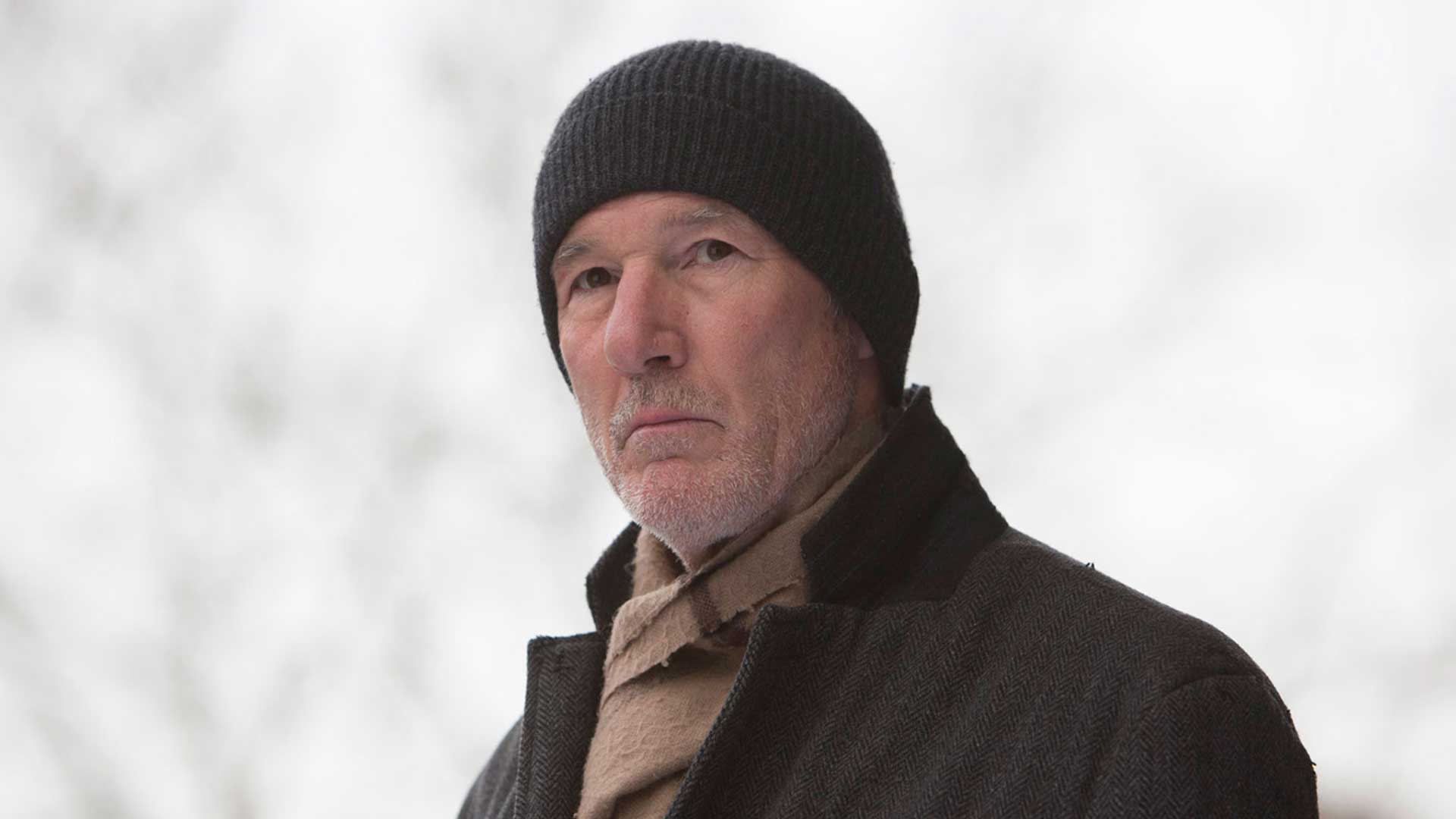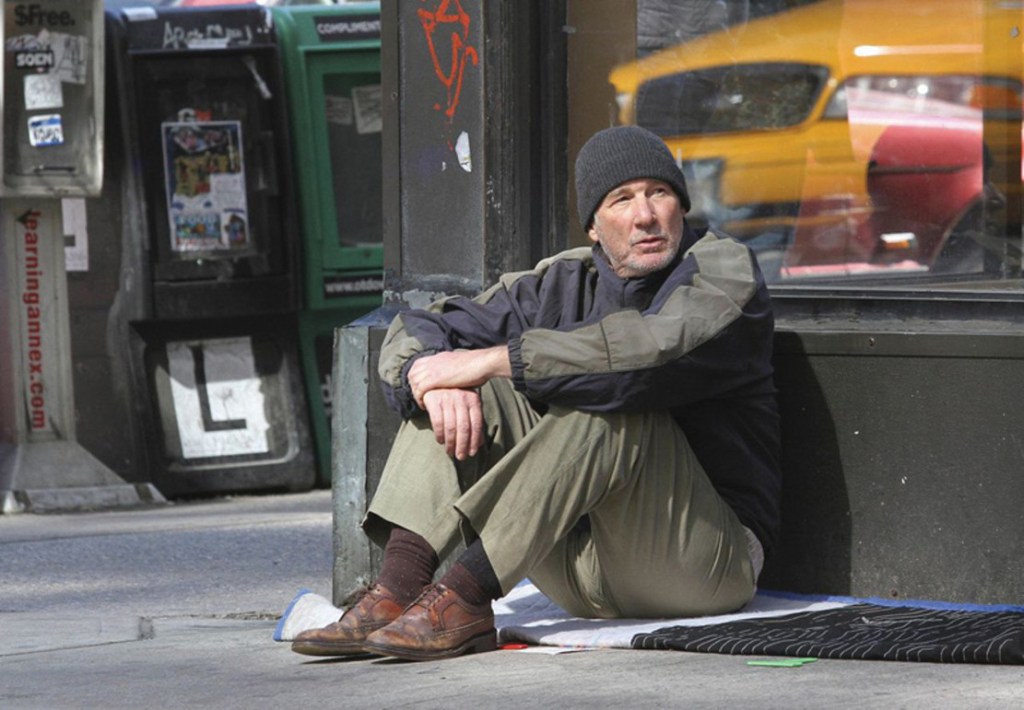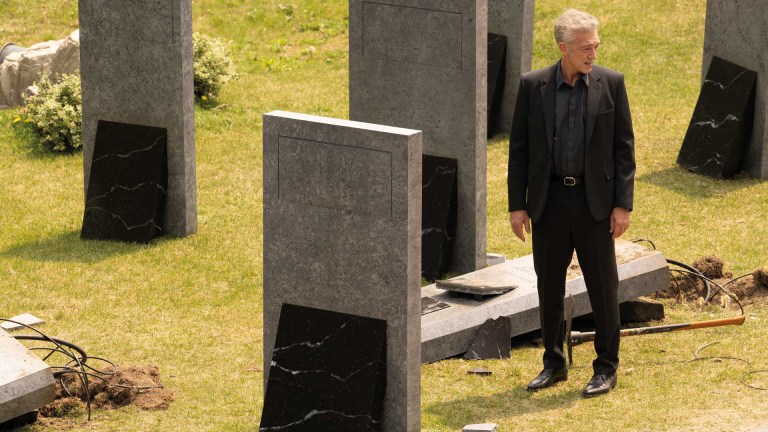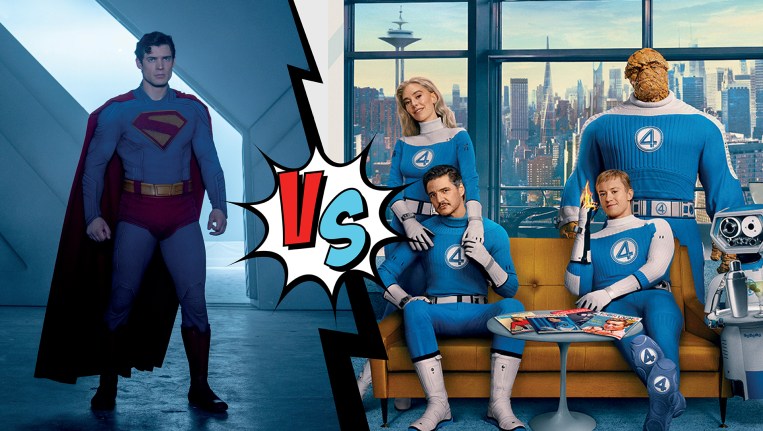Our 2020 Impact Report
The Big Issue has given more than £1 million support to Big Issue vendors struggling due to the lockdown restrictions. To mark the significant milestone, we have published an impact report, documenting the seismic shift the organisation has undergone in the past 12 months.
View ReportIt’s a good job he’s committed to traversing the globe and pounding the chat shows to get the word out because the low-budget, almost plotless Time Out of Mind will have to fight for an audience. Those who make the effort will, however, be rewarded, despite it being about half an hour too long. Gere’s performance as the isolated, alcoholic George is outstanding, suppressing the natural charisma he has in spades, while making the most of his innate presence and command to keep what might otherwise have been impatient, wandering eyes glued.
He is rarely at the centre of the screen in this documentary-style slice of life, nor is his voice always filtered among the general chatter around him. The visual metaphors employed in telling the story of a man at the margins of society might not be especially subtle – but they work. Not many will leave the cinema insensitive to the homeless people they usually swerve to avoid.
“Oh yeah, nobody looked me in the eye when I was standing begging in New York,” he says, referring to a scene in which his slumped shoulders and physical surrender ensured not one passer-by recognised him. “We shot on a long lens, no one in the street saw the cameras. Everyone you see walking around me, they’re just regular people going about their day.
The spiritual life I have is the most important thing to me
“I could see them from two blocks away, making up their mind about me because of my body language and the fact that I was still in a city where everyone is moving. They decided: homeless person, may be dangerous, wants money from me… I could see them going through the whole mental process. But it’s not about the homeless being invisible – people are putting energy into avoiding them, and that’s not the same thing.”
It’s something we at The Big Issue ask a lot: what is a home? “There is a room that is mine, a key to my letterbox which is mine. But there’s another home, which I’m more interested in. That’s an internal place inside all of us, a deeper sense of home. Where are we comfortable, where are we satisfied? No matter where you are, if you have that sense of solidity about who you are, it doesn’t really matter what your physical situation is. Like a monk.” So speaks the Buddhist who tells me he has meditated daily for 45 years.
Advertising helps fund Big Issue’s mission to end poverty
Gere is something of a paradox. He is unquestionably A Serious Man. But he’s also been a sex symbol since his big movie break in 1980 with American Gigolo, and his most celebrated roles – An Officer and a Gentleman, Pretty Woman, Chicago – have all been full-on Hollywood glamour gigs dependent on his physical allure. (He’s never even been nominated for an Oscar.) And despite the self-possession and blast of charisma that hits when you meet him, he tells me he “was, and I still am, very shy”. Hmm, do all vaguely intelligent actors say that to make themselves intriguing? He insists not.
“I think most actors start because they have an inability to fully express themselves. I think that’s the first impulse that makes us want to play a character and get on stage – it’s a vehicle to express yourself. I think most actors are very shy. I was never the kid who always got up on the table to perform. I think I’ve enjoyed acting but in some ways… in fact, I don’t think I’ve decided yet whether I’m going to be an actor.”
I laugh uproariously, assuming he’s being amusing, and he just looks at me, grinning beatifically, until I stop. (If you can’t imagine Richard Gere without recalling Steve Coogan’s majestic impersonation of him in The Trip – the middle-distance gaze and private, knowing little smile to self which preludes the answer to a question – yes, he does it in real life too. Quite a lot.) “Honestly.”
When you were the number one Hollywood poster boy, did you ever worry that you might become disconnected from another, more grounded, kind of experience, that you would be cut off from the life led by 99 per cent of the people you hope to strike a chord with?
“No,” he says confidently. “Because I was always looking for something else. I was looking for that sense of home we just talked about. Acting’s a job, a great job, and I’ve learned an enormous amount in focusing energy on that job. It’s a very intense experience, making a movie, it monopolises your time, your energy, your creativity, your soul, your everything. Everyone around you agrees that we all bring our best selves to the experience.
Advertising helps fund Big Issue’s mission to end poverty
“Then when it’s over you go back to the real world and its problems, and no one is their best selves any more. So there certainly is a drug-like aspect that you’re drawn to because of where it takes you. But while I take the creativity side of acting seriously, I’ve never taken the business seriously at all.”
So what’s the most important thing in your life?
“The spiritual life I have is the most important thing to me,” he says right away. “And in terms of commitments, it’s my son [16-year-old Homer Gere, whose mother, actress Carey Lowell, he is currently divorcing]. My son is my priority. What he needs, that’s what I do. Everything else is secondary.”
He’s been respectful and thoughtful with me which, after somewhat pooh-poohing the extra-curricular requirements of being a high-profile actor, he reassuringly stated was his intention (“I take you seriously walking in here. I’m thinking about where you’re coming from, I want to help you make this good. I’m not going to shrug and go, ‘hmmm’, ‘yes’, ‘no’”). Later on at the Q&A session in the sold-out Glasgow Film Theatre, faced with a largely female and almost entirely giddy throng, he displays a different side, and it surprises me just how much he still enjoys playing the people-pleasing pin-up.
He has all the earnestness of Robert Redford but can be as much fun as Dustin Hoffman. He shares salty anecdotes and ramps up the oestrogen count by getting out of his chair to receive impromptu hugs (“You’re the hottest man on the planet,” shrieks one devotee). He revels in sexual innuendo tos and fros, and is generally a flirty old minx. It reminds me of his answer when I asked him if he was a happy person.
“You know I asked the Dalai Lama about that once. I told him I was happy about 90 per cent of the time and he said, ‘That’s good. That is really good.’” And he looks off into the middle distance, twinkles, and breaks into a big raucous laugh.
Advertising helps fund Big Issue’s mission to end poverty
Time Out of Mind is in cinemas now











